Man Martin's Blog, page 170
March 1, 2013
Progress Marches On: The Oreo Cookie Separator
Physicist David Neevel has created a machine that takes individual Oreos, flips them perpendicular on sort of a paddle, and then saws them in half, thus saving mankind the tedium of twisting the Oreo apart for ourselves.
Some comments on this.
Some might take this as the opportunity to inveigh against American culture, that we are so spoiled, we want to eat only the sweetest part of a cookie and so lazy we dream of ways to save ourselves the trouble of making this happen. But this is to miss the point. I myself eat the whole Oreo, unseparated and undefiled; I figure this is the way Jesus made them, and mine is not to question the order of creation. I do not judge those who see it otherwise, however, and neither to I especially condemn the Oreo Corporation for marketing double-stuffed Oreos in a blatant attempt to shamelessly pander to the degenerate tastes of a hedonistic America.
The point is, how many of us have taken the time to know the true David Neevel. Did you know that he is the co-inventor of the deodorant koozy? The word koozy is trademarked, so he is forbidden to call it that, but a deodorant koozy is what it is, and I'm sure it is what many lucky beneficiaries of Neevel's invention call it. For some reason the deodorant koozy is shaped like a bear; why this is so, who can say, but the best answer perhaps is that Neevel wanted it so, and there you have it.
Neevel also, on the day he quit his job, nailed his alarm clock to a tree. What a lovely and apt piece of symbolism. The rest of us might make do with singing Johnny Paycheck's "Take this Job and Shove It," or wearing a sprig of mistletoe taped to our butts as we walk out the door, but it fell to Neevel to nail his clock to a tree.
Clearly Neevel is sort of a Mad Genius, and if ever this great nation of ours has needed another Mad Genius, it is now. I toast you David Neevel, a glass of milk and an unbroken Oreo in my hands.
Some comments on this.
Some might take this as the opportunity to inveigh against American culture, that we are so spoiled, we want to eat only the sweetest part of a cookie and so lazy we dream of ways to save ourselves the trouble of making this happen. But this is to miss the point. I myself eat the whole Oreo, unseparated and undefiled; I figure this is the way Jesus made them, and mine is not to question the order of creation. I do not judge those who see it otherwise, however, and neither to I especially condemn the Oreo Corporation for marketing double-stuffed Oreos in a blatant attempt to shamelessly pander to the degenerate tastes of a hedonistic America.
The point is, how many of us have taken the time to know the true David Neevel. Did you know that he is the co-inventor of the deodorant koozy? The word koozy is trademarked, so he is forbidden to call it that, but a deodorant koozy is what it is, and I'm sure it is what many lucky beneficiaries of Neevel's invention call it. For some reason the deodorant koozy is shaped like a bear; why this is so, who can say, but the best answer perhaps is that Neevel wanted it so, and there you have it.
Neevel also, on the day he quit his job, nailed his alarm clock to a tree. What a lovely and apt piece of symbolism. The rest of us might make do with singing Johnny Paycheck's "Take this Job and Shove It," or wearing a sprig of mistletoe taped to our butts as we walk out the door, but it fell to Neevel to nail his clock to a tree.
Clearly Neevel is sort of a Mad Genius, and if ever this great nation of ours has needed another Mad Genius, it is now. I toast you David Neevel, a glass of milk and an unbroken Oreo in my hands.
Published on March 01, 2013 02:59
February 28, 2013
Coffee
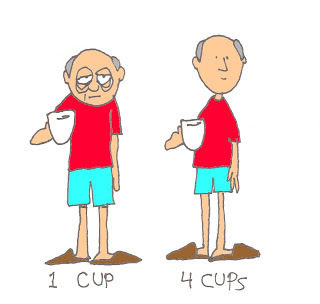 I drink approximately a quart of very strong coffee every morning. By strong, I mean a spoon will stand upright in it. When people ask me the secret of my alarming productivity, this is the answer I give them. I give them the same answer when they ask about my wide staring eyes or hands that shake like jack-hammers. Medical research reliably informs me that coffee drinkers are healthier than other people, so there. It also informs me that drinking one glass of red wine each night helps you like two to five years longer. At this rate, I should live at least an additional twenty years or so.
I drink approximately a quart of very strong coffee every morning. By strong, I mean a spoon will stand upright in it. When people ask me the secret of my alarming productivity, this is the answer I give them. I give them the same answer when they ask about my wide staring eyes or hands that shake like jack-hammers. Medical research reliably informs me that coffee drinkers are healthier than other people, so there. It also informs me that drinking one glass of red wine each night helps you like two to five years longer. At this rate, I should live at least an additional twenty years or so.I get up before Nancy, brew a pot of coffee, and write in the mornings. Usually I spill some coffee, too: sometimes on the counter, sometimes on the floor, sometimes in the bag where she keeps all her study materials for Mandarin Chinese. I try to spill a different place every morning because I like to imagine Nancy's delight wondering, "Where will I find a coffee spill this time?" I do what I can after thirty years of marriage to keep a sense of mystery alive.
Unfortunately, by the time Nancy gets up, the coffee, which has been sitting in the pot two or three hours, is no longer the wholesome and pleasant beverage it once was. It has become bitter and unsavory, and a tar-like residue has formed on its bottom: not unlike dear Aunt Bessie before we shipped her to the Old Folk's Home. So Nancy, what a thoughtful wonderful woman, has started setting up the coffee pot at night, putting in just enough coffee for me, and then brewing herself a fresh pot when she gets up. What a dear!
The catch is in that phrase, "just enough." There is no such quantity as "just enough coffee;" there is either "not enough" or "more than enough;" there is nothing in between. I do not understand the sort of person who stops at one cup, for whom the "second cup" is a naughty indulgence; for me the second cup is merely an interval before the third and fourth. Nancy, however, does not see it this way. Judging by the portion she brews me, "just enough," is a cup and a half. My "just enough" is a less definable quantity. Essentially, coffee is something I measure in time. I begin drinking it at 5:30 or so, and keep drinking until 6:45 when I leave for work. If there's still coffee left in the pot, there was enough. If there isn't, there wasn't.
I suppose if I'm dissatisfied with the parsimonious quantity of coffee Nancy allots me, I should just get off my ample butt in the evening, and set up the coffee myself, a quantity more to my liking. The only problem is, Nancy always does this between 7:00 and 9:00. PM and I'm not at my best or most alert during those hours. I haven't had my coffee yet.
Published on February 28, 2013 02:40
February 27, 2013
Killing the Frog: Ian Frazier
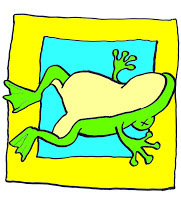
E B White said, “Analyzing humor is like dissecting a frog. Few people are interested and the frog dies.” From time to time I treat humor as a topic for serious analysis, knowing beforehand how few people will be interested and that a joke's internal organs cease functioning as soon as I lay them on our metal tray for examination.
Many years ago, I was reading a New Yorker piece, "Coyote v Acme Company," a lawsuit filed on behalf of the long-suffering coyote of Roadrunner fame. I had been chuckling throughout, but then I came to a list enumerating the results of an Acme bomb's untimely detonation:
1. Severe singeing of the hair on the head, neck, and muzzle.
2. Sooty discoloration.
3. Fracture of the left ear at the stem, causing the ear to dangle in the aftershock with a creaking noise.
4. Full or partial combustion of the whiskers, producing kinking, frazzling, and ashy disintegration.
5. Radical widening of the eyes, due to brow and lid charring.
 When I got to number three, I had to put down The New Yorker, I was laughing so hard. There are only two other authors - Robert Benchley and P G Wodehouse - who have made me laugh so hard, I had to stop reading until I finished.
When I got to number three, I had to put down The New Yorker, I was laughing so hard. There are only two other authors - Robert Benchley and P G Wodehouse - who have made me laugh so hard, I had to stop reading until I finished. What is it about the third item that struck me as so hilarious? What can other humorists learn from it?
Of course, taken out of context, the list isn't be as funny and scarcely even makes sense. The essay is delightful from start to finish; it just reached a peak for me at that moment. Just seeing the title, "Coyote v Acme," brings an anticipatory smile to the reader.
One of Ian Frazier's specialties I call "Appropriated Language." It works like this: take a highly distinctive and self-serious writing style - a legal complaint, the King James Bible, a stockholder's report - and apply it to an everyday situation, for example, the directions for assembling a bookcase written like something from Leviticus. In a way, this is just the principle of keeping a straight face while telling a joke: the subject matter is humorous, but the writing style itself is absolutely deadpan and unsmiling. Half the joke is the bubbling sensation that the speaker doesn't realize it's funny. The trick is finding a combination of style and content that is so unexpected and yet so perfectly apt.
 Frazier hits upon the perfect combination in at least two other pieces, "How to Operate the Shower Curtain," a maddeningly explicit instruction manual for an overnight guest, and "Laws Concerning Food and Drink; Household Principles; Lamentations of the Father:"
Frazier hits upon the perfect combination in at least two other pieces, "How to Operate the Shower Curtain," a maddeningly explicit instruction manual for an overnight guest, and "Laws Concerning Food and Drink; Household Principles; Lamentations of the Father:""And though the pieces of broccoli are very like small trees, do not stand them upright to make a forest, because we do not do that, that is why. Sit as I have told you, and do not lean to one side or the other, nor slide down until you have almost slid away. Heed me; for if you sit like that, your hair will go into the syrup. And now behold, even as I have said, it has come to pass."
What combination of instinct, luck, or trial and error gave Frazier this idea we can't know, but what a jewel it is. The diction of the frustrated father and frustrated Yahweh are so similar as are their relationships to their willful children, it takes only the slightest adjustment to change, "Now look, that's just what I said would happen," into "And now behold, even as I have said, it has come to pass." The match between the appropriated style and the content has to be so far far-fetched and at the same time so precise that it isn't merely comic, it seems necessary and inevitable; the reader feels he's discovering something he has thought of himself, but that somehow Frazier got around to writing it first. We'd been waiting all our lives for Wiley Coyote to sue Acme.
 But even were it possible - using some Smart Phone app, say - to pair writing styles with topics until we generated a match as unlikely and perfect as "Coyote v Acme" or "Lamentations of the Father," creating something worthy of the potential would still require the sure hand of the master. Anyone can stick a woman in a chair and wait for an enigmatic expression to cross her face; it requires Leonardo to give us Mona Lisa.
But even were it possible - using some Smart Phone app, say - to pair writing styles with topics until we generated a match as unlikely and perfect as "Coyote v Acme" or "Lamentations of the Father," creating something worthy of the potential would still require the sure hand of the master. Anyone can stick a woman in a chair and wait for an enigmatic expression to cross her face; it requires Leonardo to give us Mona Lisa.I believe it was the cartoonist Brian Savage who said a cartoon must contain time. Even in a one-panel cartoon of a man in front of a firing squad, there's time. Not much, but some. The reader's reconstruction of the past or foreseeing an outcome is the source of his delight in humor. Chuck Jones, the animator of the Roadrunner cartoons, was past master at manipulating time. He knew how to freeze a moment, so when the coyote runs off a cliff, he hangs midair until he has time to study the precipitous distance below and then look at the audience in blinking dismay. When a catapulted boulder smashes him, we never see it hit. Instead, he is blanketed under a widening shadow, and then BAM. The rock is suddenly just there, filling the entire screen, a few puffs of dust rising around it.
Frazier has the same gift with time, but must work in the more recalcitrant medium of words. The impersonal diction of legalese or poetry of King James is essentially timeless, not in the sense that it never changes - although that too - but that it seems to refer to some arid desert of eternity where change does not intrude. It's Frazier's gift for smuggling in bits of time in the stiffest of prose styles that raises his work from something that merely could be great into something that is. Watching the child slide down in his seat until his hair is in the syrup, or hearing the woeful creak of the coyote's half-severed ear: those are the moments we laugh so hard we put down the book.
Published on February 27, 2013 02:34
February 26, 2013
Shakespeare's Agent
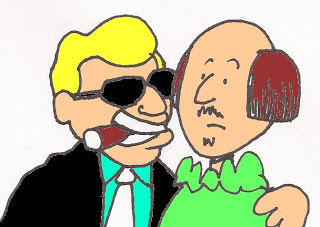 Bill,
Bill,Just read the screenplay treatment for King Lear, love it, love it, LOVE IT!
The studio boys have just a couple of minor suggestions, you know, just some minor tweaks, you know, we'd never dream of changing your script, just nudge it here and there.
First of all, Cordelia, what a great character. Loyal, outspoken, tough. We picture her being played by Anne Hathaway. Just one minor thing, the screenplay doesn't have a lot of ess-ee-ex in it, does it? We were thinking, maybe during the storm scene, the rain soaks her thin cotton blouse to her skin. You getting a visual here, Bill? Maybe her whole dress could get ripped off altogether in a tornado. Only problem is, Cordelia's not in the storm scene. See the problem here? Now Edgar's in the storm scene - we're hoping for Zac Ephron - and he's stripped naked pretending to be a lunatic. Now that's great, only problem is, audiences won't pay to see a guy naked, even if it is Zac Ephron. We don't know why, it's just the way it is. They'll pay to see a naked girl, but not a guy. Anne's never done a nude scene, but she says she'd be willing to, if it's artistic, which this definitely is. So here's what we're thinking: Anne Hathaway, Zac Ephron, storm scene together. It's cold, it's raining, it's the tenth century. They turn to each other for warmth. You getting a visual here?
Speaking of Edgar, the producer loves, loves, LOVES the whole brother against brother thing. For the evil brother Edmund we're thinking Hugh Jackman. But, Billy Baby, you're killing us with these names Edmund/Edgar. No one's ever going to keep it straight. We don't want to change a thing, but maybe give them more distinctive names. Like we could call Edmund, Cranio, and give him this huge outsized brain with pulsing veins running all over his skull see? Like, because he's super-intelligent. And Edgar, we'd just name him something ordinary like Scott, except, what Scott doesn't know, is that fire ant that bit him the other day, was no ordinary fire ant, but a radioactive prototype the Pentagon was working on, and now Scott, has the super strength of an ant! (They can lift 20 times their own weight) only he doesn't know he has super powers and has to discover in a final death match with his evil half-brother.
And Regan and Goneril - they are going to be the sisters audiences love to hate! We're thinking Sophia Vergara and Angelina Jolie. You might think of adding one small scene - when they're in their castle and Goneril has come all this way to visit Regan, I mean she's gotta be dirty, right? And those old drafty castles, they couldn't have had up-to-date shower facilities. So naturally, the two sisters are going to have to shower together, right? Are you getting a visual here, Bill? It's just pure realism, plus it would make the two evil sisters a little more sympathetic.
And the blinding scene, what can I say, but wow! By the way, we're thinking Tommy Lee Jones for Gloucester. But what if, and this is just a what if, because we don't want to change a thing, what if the whole time Gloucester is wearing a wire! He's working undercover for the king! And when Cornwall goes to blind him, he says, "Hey, I think this guy's wearing a wire," and Gloucester says he isn't, only he really is! By the way, we're thinking Quentin Tarantino for Cornwall. It'd also be cool if Gloucester knew some karate or some secret martial arts he'd picked up or was a sensei master or something. You could still blind him and all, but that way if Lear goes over big at the box-office we'd be fixed for a sequel: Gloucester running around, kicking butt and getting revenge. We already got a promo line: "Gloucester: You'll never see him coming!" Kind of a play on the whole idea that he's the one who's blind.
Anyway, like we said we all love the script and don't want to change a thing. Oh, except there's one minor thing. The whole King Lear/madness thing. PR says the whole senile dementia thing is a big no-no. Don't want to go stirring up AARP and get them mad at you. So we need to take out the whole bit about Lear going mad, running off in the rain, howling at the gods, etc. Instead, we're thinking Lear has unknowingly been bombarded with secret government radiation, and whenever he blows his top, BLOOEY! He turns into this super-human killing machine! We're thinking Dwayne "The Rock" Johnson.
You getting a visual?
Published on February 26, 2013 02:35
February 25, 2013
Consider the Echidna
 The Echidna is a monotreme or egg-laying mammal, which is pretty remarkable, but its cousin, the platypus gets all the attention, maybe because of its adorable little duckbill, precious little otter feet, cute little beaver tail, and lovable venomous sting. Everyone knows what a platypus is, but if you mention the echidna, they're likely to say, "What?" (As I type this blog, every time I mention platypus, my computer is fine with it, but it underlines echidna in red, as if to say, "Are you sure you don't mean 'chicana?'")
The Echidna is a monotreme or egg-laying mammal, which is pretty remarkable, but its cousin, the platypus gets all the attention, maybe because of its adorable little duckbill, precious little otter feet, cute little beaver tail, and lovable venomous sting. Everyone knows what a platypus is, but if you mention the echidna, they're likely to say, "What?" (As I type this blog, every time I mention platypus, my computer is fine with it, but it underlines echidna in red, as if to say, "Are you sure you don't mean 'chicana?'") Like the platypus, the echidna has a spur on its hind foot, which doesn't get the attention it deserves, maybe because unlike the platypus, the spur is nonvenomous. "What's the fun of having a spur if it's nonvenomous?" is what amateur naturalists want to know. Nevertheless, the echidna has many unique characteristics in its own right; for example, the echidna penis has four heads; I bet you didn't know that. Well, the female echidna knows it.
Echidnas might strike people as more interesting if they didn't look so much like other, more common mammals. Waddling around with their spiny hides they look like porcupines or spiny anteaters, which they are no more closely related to than they are to Bruce Willis, another creature whom they superficially resemble.
Placental mammals are apt to view monotremes with contempt. "Why don't you get with the program?" they ask. "If you're going to have mammary glands, then have a live birth, why don't you?" Placental mammals think just because they're in the majority, anything that's not placental is backward or abnormal. As far as they're concerned marsupials are better than monotremes, but not much. The way they see it, giving birth to a live, relatively fully developed individual is the only way to go for a fully-evolved mammal.
The issue of which reproductive method is superior is one an echidna might put to a human woman in the throes of labor. "How's it going, dearie?" the echidna would ask. "You're pushing a nine-pound infant through your vaginal tract? Oh, my. Isn't that a little like trying to get a bowling ball down a tube sock? I just lay a soft leathery egg which I store in my pouch until it hatches. Then I'll nurse it for about a month before putting it in a little burrow and returning once every five days until it's weaned. How often will that little cub of yours need to be nursed? Oh, my. As often as that? But when will you sleep? Well, well, well. It certainly must be a challenge being all advanced and fully evolved like you. Oh, by the way, did I mention my mate has a penis with four heads?"
Unlike many placental mammals I could name, the monotremes are doing quite nicely, thank you, and only one of them - Attenborough's Echidna is considered Critically Endangered. The truth is, there's no such thing as being "more evolved" or "less evolved." We're all evolved; echidnas just found what worked for them and stuck with it before the rest of us.
Published on February 25, 2013 02:31
February 24, 2013
Consider the Manatee
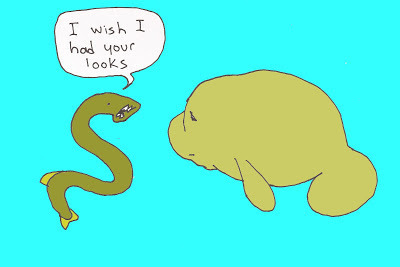 The Manatee is large, not very fast moving aquatic mammal, lacking the grace of the porpoise and dolphin. The latter two, of course, are cetaceans and the manatee is a sirenia, which probably explains it. You never see high-spirited manatee leaping from the surface of the water, and Sea World does not have a "manatee show" featuring manatees leaping through hoops, playing underwater basketball, or whatever tricks dolphins and killer whales do. There is a reason for this.
The Manatee is large, not very fast moving aquatic mammal, lacking the grace of the porpoise and dolphin. The latter two, of course, are cetaceans and the manatee is a sirenia, which probably explains it. You never see high-spirited manatee leaping from the surface of the water, and Sea World does not have a "manatee show" featuring manatees leaping through hoops, playing underwater basketball, or whatever tricks dolphins and killer whales do. There is a reason for this.Manatees are also known as sea-cows, which is mildly defamatory to cows. Compared to a manatee, a cow is a chiseled and svelte physique. Manatees look like something a three-year-old starting making out of Play-Doh and left unfinished. The name manatee comes from a pre-Colombian word meaning breast, which is an odd thing to single out about this animal. Whether the name signifies that the manatee nurse their young, that the body vaguely resembles a large boob, or something made by a large boob is unclear. The order sirenia, to which manatees belong, refers to the sirens of mythology because sightings by ancient sailors may be what gave rise to legends of mermaids. This will give you an idea of how terribly lonely ancient sailors must have been.
The plight of the manatee - which faces probable extinction - has stirred many people to action. In waterways all over Florida, you will see signs posted telling boaters to slow their engines and watch for manatees. A manatee lacerated by an outboard motor has an expression of stupefied betrayal, as if to say, "What happened to me?" and this naturally arouses the sympathy and indignation of people. While not minimizing the seriousness of protecting wildlife, it should be noted that the manatee always looks stupefied and betrayed, it can't help it; it's the only expression its face has.
The Pacific lamprey is also endangered, but maybe doesn't get the attention it deserves because it's not as lovably mopey-looking as a manatee. Putting it frankly, lampreys are creepy looking. Look inside a lamprey's mouth and you'll see rows and rows of little teeth like something in a creepy science fiction movie. Also, some lampreys cling to other fish and suck their blood, not all lampreys, just some, but you know how people tend to stereotype. The manatee looks like a science-fiction creation, too, but one of the lovable variety, something Frank Oz would supply a voice to and talk in inverted syntax, "Ooh, dark days ahead I see."
The lesson for the rest of us is looks matter, and this is as true among the ecologicall- minded as the rest of us. If you have a lamprey's funnel-like sucking mouth and slimy eel-like skin, you need to visit your orthodontist and dermatologist promptly. Better to be a misshapen but oddly endearing lump like the manatee.
The world is a cruel hard place with asteroids, and psycopaths, and outboard motors overhead. You need to be wily, smart, and fast on your feet. If you can't be that, be lovable.
Published on February 24, 2013 03:58
February 23, 2013
The Gospel According to O'Reilly
 Fox News personality Bill O'Reilly has announced that Killing Jesus: A History will be his follow-up book to the NYT Bestsellers Killing Lincoln and Killing Kennedy.“Jesus Christ has not walked among us physically for more than two thousand years, yet his presence today is felt the world over and his spirit is worshipped by more than 2.2 billion people,” said O’Reilly. “His teachings, his legacy, his life as a flesh-and-blood man, and his death created the world in which we live.” - Huffington Post
Fox News personality Bill O'Reilly has announced that Killing Jesus: A History will be his follow-up book to the NYT Bestsellers Killing Lincoln and Killing Kennedy.“Jesus Christ has not walked among us physically for more than two thousand years, yet his presence today is felt the world over and his spirit is worshipped by more than 2.2 billion people,” said O’Reilly. “His teachings, his legacy, his life as a flesh-and-blood man, and his death created the world in which we live.” - Huffington PostAnd Jesus spake unto them and saith, "Blessed are you who are poor for no one wants to look you in the eye and tell you you're irresponsible and lazy, and who's gonna do that? Because that's what poverty is. You can succeed if you get educated and work hard. Period. Period."
Two sinners were brought before him, taken in fornication, and the Pharisees said to Jesus, "Rabbi, these people were taken in adultery. In the law Moses commanded us to stone such people, what shall we do." And Jesus spoke unto the adulterers, saying, "This is my advice to all you homosexuals, whether you're in the Boyscouts, the army, or high school. Shut up, don't tell anybody what you do, and your life will be a lot easier."
So the soldiers took charge of Jesus. Carrying his cross, they took him to the Place of the Skull, called Golgotha, and there they crucified him. And Jesus hung upon the cross and said, "Lotsa people want to hurt me. That's the price you pay for having a big mouth."
Published on February 23, 2013 03:27
February 22, 2013
Please Help Me, I'm a Doomed Character on Downton Abbey
 Someone help me please.
Someone help me please.I am a character on Downton Abbey; my contract forbids me from saying which one, as does Julian Fellowes, the sadistic SOB who writes this tripe. Suffice to say I am not one of the many characters who has already died - if you've been able to keep track of them - nor am I the Dowager Duchess (played by Maggie Smith, who to all appearances may be immortal; I believe she preys on the blood of the living.)
I am certain to die because in the previous season, Julian took such pains to show me content, the cup of happiness at my very lips. This is how he always does it, the madman. He doesn't merely kill you, no; first, he has to tantalize you with the promise of a happy story line. Your only hope of survival is to stay mired in such misery and shame that he'll never let you die. When Dan [Dan Stevens who portrays Matthew Crawley] saw in rehearsal that he'd been given the lines "I'm so happy," he broke down and wept. He knew it spelled curtains for him. Sure enough, two episodes later, bammo. Car crash. Ditto for Jessica [Jessica Brown Findlay, Lady Sybil] she had a scene saying how perfect her life was. She knew it would be bad, but she hoped it would be a miscarriage. Or maybe the baby would be hideously deformed. No such luck.
Next thing you know, she's snuffed it, just another plot device to Julian's cruel whims.
Lately everything has been working out for me. That's how I know I'm done for. And I know my end won't be pleasant. It never is. A bite from a poisonous scorpion brought back from India followed by a lingering and ghastly death is the best I can hope for. But there's still a slim chance. Some general disaster that affects the entire cast might distract Julian, give him enough melodramatic fodder he'd lay aside his foul designs on my life. Please write in and suggest a fire break out and burn down the entire joint, or Hitler stages a surprise early invasion a couple of decades ahead of schedule or there's zombies or something.
I just got a look at next season's script. My first line is, "I can't imagine how life could get any better." Hurry or I'm done for.
Published on February 22, 2013 02:56
February 21, 2013
More Thoughts on the Cold Theme
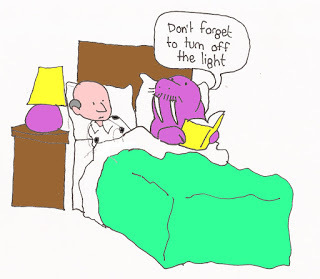 You have about the same odds of avoiding your spouse's cold
You have about the same odds of avoiding your spouse's coldas getting into bed with a walrus and not getting moistEveryone blames the rhinovirus but really the problem with colds is the human body. All the symptoms you can name - sneezing, coughing, itchy eyes, fatigue - are not the virus itself but the body's attempt to fight the virus off. Lewis Thomas once wrote that the body's reaction to the rhinovirus is the equivalent of dropping nuclear bombs to deal with a burglary. What makes it even worse is that so much of this - the sneezing and coughing - is precisely what makes you so contagious. So basically, when the rhinovirus enters your body, it tricks you into producing a bunch of annoying symptoms, which in turn help spread the virus. For something only 30 nanometers in diameter, the rhinovirus is pretty sneaky.
There are about a hundred different types of rhinovirus out there, but the only one you need to worry about is the one your wife or husband has, because that's the one you're going to get. Of course, all the usual precautions should be taken - wash your hands frequently, cover your mouth when you cough, etc, etc, but when you live with someone, it's dollars to donuts, if they catch something, you will too. You have about the same odds of avoiding your spouse's cold as getting in bed next to a walrus without getting moist.
This is why you have to especially nice to your mate when they develop a cold; before you know it, it's going to be your turn. And it doesn't do any good blaming them when you get the cold because sooner or later, you're likely to give the cold right back. I suggest when someone gets a cold, he should be given plenty of ice cream (Butter Pecan) back rubs, and be allowed to watch whatever he wants on tv. That way, when you get the cold, it'll be your turn.
The only problem is that if the recuperation period is too pleasant, the patient might draw it out.
"How is it you still have that winter cold? It's August."
This, however, is a risk we must take.
Published on February 21, 2013 03:12
February 20, 2013
Head Colds and Other Pastimes
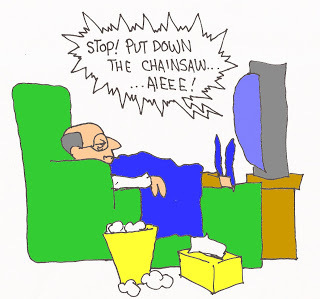 FIG 1As I write this, I am in the grip of a virus or microbe or some other tiny being. Were a doctor to enter the house, he would diagnose me in a jiffy; I have all the symptoms of the classic common cold:
FIG 1As I write this, I am in the grip of a virus or microbe or some other tiny being. Were a doctor to enter the house, he would diagnose me in a jiffy; I have all the symptoms of the classic common cold:1. Itchy, watery eyes2. Cough3. Waste-basket full of used tissues4. Horror movie on Netflix5. Patient and long-suffering wife who's beginning to wonder just how much more patient she can be or longer she will have to suffer
The trick to managing an illness in front of your wife is you have to be brave about it, but not too brave. If you act like a cold isn't a big deal and are too convincing about it, she's apt to write out a Honey-Do list, and the next thing you know, you're repairing shingles on the roof. On the other hand, if you make too be a deal of it, she's likely to tell you to stop being such a big baby about it and remind you of the time she had bronchitis and still managed to re-Spackle the bathroom ceiling.
Playing the invalid is especially tricky around in Martin because Nancy has always been pretty much tough as nails when it comes to her own physical ailments. In fact, I've seen Nancy give a barrel of two-penny nails in the hardware store a contemptuous glance, like, "Nails. Huh. What a bunch of wusses."
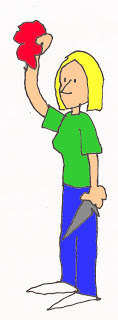 FIG 2A brief true narrative to illustrate my point. One evening, while Nancy was cooking dinner, she called me into the kitchen with a dulcet, "Honey, could you come in here?" I found Nancy holding aloft a red rag, just about ear-level. Looking more closely, I saw it was not a red rag but a white one stained red with my sweetheart's own blood. Evidently her hand had slipped while using a knife to break the little metal cap-seal on a bottle of olive oil. (Bear in mind, the point of this story is to point out Nancy's toughness, not her commonsense.) We rinsed out the wound and determined that, yes, it was definitely going to need stitches, and I got the car keys to take her to the emergency room.
FIG 2A brief true narrative to illustrate my point. One evening, while Nancy was cooking dinner, she called me into the kitchen with a dulcet, "Honey, could you come in here?" I found Nancy holding aloft a red rag, just about ear-level. Looking more closely, I saw it was not a red rag but a white one stained red with my sweetheart's own blood. Evidently her hand had slipped while using a knife to break the little metal cap-seal on a bottle of olive oil. (Bear in mind, the point of this story is to point out Nancy's toughness, not her commonsense.) We rinsed out the wound and determined that, yes, it was definitely going to need stitches, and I got the car keys to take her to the emergency room.It was at this juncture, Nancy said - and I am not making this up - "But darling, I just fried the fish, and it won't be good cold."
So before I drove her to the emergency room, we ate the fish, Nancy standing like the Statue of Liberty, except with a blood-stained rag instead of a torch.
This is the sort of stunt that makes it difficult later on for someone to take full advantage of ill health and squeeze every drop of compassion, indulgence, and personal service that a head cold deserves. And yet I soldier on.
Published on February 20, 2013 02:53



